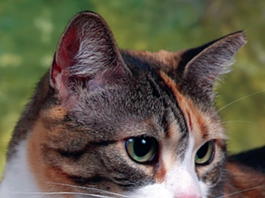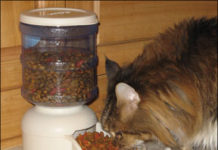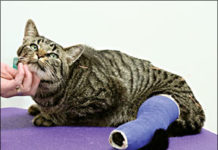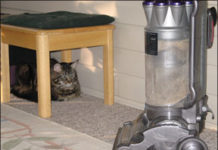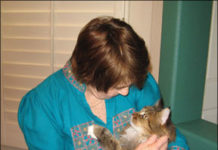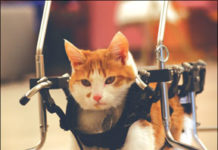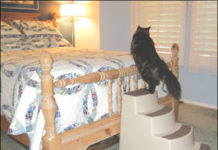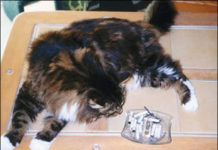Some Help for Busy Owners
Ann McGorty was having a problem getting her cat, Jesse, to drink enough water. Jesse ignored the bowls of fresh water that were strategically placed around the house, preferring instead to drink water from a drippy faucet. Thats when McGorty had an idea. What if she could provide fresh, running water for Jesse all the time? "I thought it would be a novel idea to get an automatic waterer for my cat," the Santa Barbara, California, resident remembers. "Nothing else was working." McGorty went online and purchased an electric waterer that doubled as an attractive fountain. Most importantly, her cat was drinking more water. "Jesse now loves drinking water and finds the fountain very entertaining," she enthuses.
How Acupuncture Works
Three or four decades ago, few cat owners or veterinary practitioners in the U.S. knew anything whatsoever about acupuncture, the centuries-old Chinese system of health care that aims to treat physical disorders and their accompanying pain by inserting needles into specific points on a patients body. Today, thousands of veterinarians throughout the nation routinely practice acupuncture in their clinics, and countless cats are benefiting from it. "Im certainly an acupuncture advocate," says Andrea Looney, DVM, a lecturer in anesthesiology at the Cornell University Hospital for Animals. "I use it in treating between 10 percent and 20 percent of the patients that I see - not only cats, but dogs, horses and other animals as well." Dr. Looney stresses that she relies on acupuncture as a complementary technique, always using it in conjunction with the standard practices of Western veterinary medicine. "The fact that more veterinarians are skeptical and refuse to practice it," she says, "is a sad situation."
Is Your Cat Afraid of Noise?
Whenever cat owner Gina turns on her printer, her cat Leon dashes over to sit on it, lie on it and watch in earnest as the paper comes out. But when Ginas friend Diane turns on her printer, her cat, Petunia, flees in terror. Cats respond differently to noise depending on their personalities and experiences - and even their genetics. When cats get scared of noise, we often feel the need to protect them. Most of the time, thats not necessary. But heres how you can help your cat cope naturally with noise. Cats differ from dogs when it comes to being frightened by noise. Dogs are notoriously afraid of thunder and fireworks, and will often try to escape from the house in a panic. Cats are more likely to be scared of unexpected noises around the house, such as the vacuum cleaner, construction work or a hair dryer. "But thunder and fireworks dont seem to bother cats," says Katherine A. Houpt, VMD, PhD, the James Law Professor of Animal Behavior at Cornell Universitys College of Veterinary Medicine. "I have never seen fireworks or thunder phobia in cats," she says.
How to Keep Your Cat Healthy
You gaze at your adorable feline and wonder: How could you ever live without her? But you know, as a rule, that cats dont live as long as humans. On average, cats live about 14 years. But the good news is that thanks to improved veterinary medicine and owner involvement, cats are living longer and longer, often exceeding the average lifespan by many years. There are many stories of cats living to their mid or late 20s. There seems to be valid documentation for an unneutered female cat named Spike from the United Kingdom who lived to be 31. Spike's case was extremely rare, but more stories come out each year about cats living to very ripe old ages. Could your cat be blessed with an extra long life? While genetics and luck have some influence over a cats lifespan, there are a number of things you can do to increase your cats longevity.
Making a Move?
Moving day can be a miserable, hectic blur - one of those times youd like to be able to just twitch your nose and be done with it. Unfortunately, it just isn't that easy. And cat owners have the added stress of worrying about how their cat(s) will react to the disorder and mayhem. However, there are several precautions that can be taken to help ensure that your pet will remain safe during the move and to promote a quick adjustment to his new home. Losing your cat on moving day is something to be avoided at all costs. Julia Albright, DVM, a resident in animal behavior at the Cornell University Hospital for Animals, explains, "Dealing with a lost pet on such a busy day is a nightmare. Pets are notorious for sneaking out on moving day; confining the cat to a bedroom or bathroom with a note on the door is a great idea." Make sure that the cat has food, water, litter and is comfortable - and then close the door and put a highly visible note on it, spelling out in no uncertain terms that the door must remain closed. Not only will this reduce the cats anxiety at seeing everything familiar removed from the home, but it will also help ensure that the cat does not dart out an open door. When it comes time to transfer the cat, crate her while shes in the confinement area and double-check the latch before opening the door.
Finding Lost Indoor Cats
Perhaps one of the scariest thoughts for the owner of an indoor-only cat is that of your cat having to fend for himself in the great outdoors. Julia Albright, DVM, a resident in animal behavior at the Cornell University Hospital for Animals, says, "Keeping your cat indoors is the best way to provide a safe environment for him. Outside your home the cat may be exposed to other cats, cars and predators." However, accidents do happen, no matter how careful we are. A window screen may pop out unexpectedly, or a repairman may leave the door open "just for a second" while he grabs a tool from the truck. But apart from regularly checking window and door screens and making sure that all visitors know that your cat is strictly an indoor cat, the only thing you can do is prepare yourself for the occasion when he does get out.
Changing Your Cat’s Diet
If switching your cats food is warranted, be sure to do it gradually. For any number of reasons, you may feel that your cat could do well with a change in diet. If thats the case, contact your cats veterinarian for advice. Find out if switching foods is indeed necessary and will truly benefit your animals overall health. If your veterinarian recommends a diet change, you should make the switch gradually so that the cats digestive system can properly adjust to the new food. "Its good to offer your cat a bit of variety within each meal," says Ilona Rodan, DVM, director of the Cat Care Clinic in Madison, WI. "You can accomplish that by mixing two foods that have different shapes and sizes, or by blending canned and dry food. That will help prevent the animal from becoming fixated on one specific type of food, which is important in case a diet change is needed for medical reasons later in the animals life." Otherwise, Dr. Rodan says, cats dont really need more variety than that, and change merely for the sake of change is unnecessary.
Kitty Kindergarten
Imagine a cat that goes into its carrier on command, sits calmly while its claws are clipped, lies down for grooming and knows a few tricks. And while youre dreaming of the perfect feline, add this idea to your fantasy: The cat takes pills easily and actually uses the scratching post - and not the back of your couch. Wake up! It was a nice dream, wasnt it? Actually, this image of a feline housepet may not be so far-fetched - particularly if cat owners take advantage of a new training concept called "kitty kindergarten." The program is very similar in purpose to "puppy preschool" in that its main focus is to save pet lives by educating owners - and having some fun along the way.
Help for Handicapped Cats
For four years, Kathy Barton, a fourth-grade teacher in Velma, Oklahoma, has engaged her class in a worthwhile project involving animals. This past year, she was introduced to a two-year-old male cat named Xavier that had been unable to walk since birth due to an undetermined neurological disorder. Barton knew where to turn for help for this cat, a place she had relied on before for animals like him. Barton contacted HandicappedPets.com, a website offering products, services and support for elderly, disabled and handicapped pets. Bartons class raised $700 to buy Xavier a quad cart - a mobile chair that helps disabled animals to get around.
Cats With Double Lives
Recently, a woman asked for advice in a chat room for pet enthusiasts. She explained that her outdoor cat would go off for days, sometimes a week at a time. Naturally, she would worry about him. Then, just as mysteriously as he had left, he would show up again at her door and make himself at home as if he had never left. One day during one of her cats absences, the woman went to visit a neighbor down the street. As the neighbor asked her in for a cup of coffee, the woman shouted, "Theres my cat!" Indeed, there was her cat lounging on her neighbors couch.
Arthritis: A Common Problem
Cats are living longer these days, thanks largely to advances in feline nutrition and veterinary medicine in general. Thats good news. The bad news, however, is that these longer life spans give cats a greater chance of developing arthritis - a painful, debilitating and potentially crippling joint disease that is predominantly age-related. In a study conducted a few years ago, researchers carefully analyzed X-rays of the spines and limbs of 100 middle-aged or elderly cats (10 years of age or older). The X-rays revealed that 90 percent of cats over age 12 showed clearly discernible radiographic signs of arthritis.
Secondhand Smoke: Dangerous
The American Lung Association defines secondhand smoke, also known as environmental tobacco smoke, as a mixture of the smoke exhaled from the lungs of smokers and the smoke that is given off by the burning end of a cigarette, pipe or cigar. These ambient fumes, which can linger in the air for hours after the source has been extinguished, will then be involuntarily inhaled by nonsmokers - with potentially deadly consequences.



